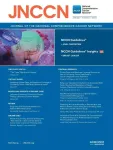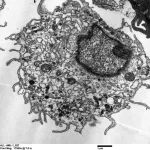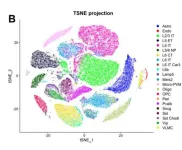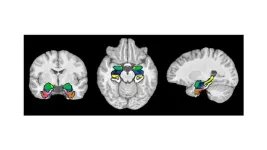Food-drug interactions could be impactful for some lung cancer patients according to new study in JNCCN
New study on diet-medication interactions warns that targeted treatment alectinib becomes less effective when taken with a low-fat breakfast.
2023-06-12
(Press-News.org) PLYMOUTH MEETING, PA [June 12, 2023] — New research in the June 2023 issue of JNCCN—Journal of the National Comprehensive Cancer Network found that when alectinib—a safe and effective small molecule kinase inhibitor used to treat some types of advanced lung cancer—was taken with a fuller breakfast, or with lunch, it resulted in significantly higher drug concentrations than when taken with a low-fat breakfast. The researchers, based out of Rotterdam, The Netherlands, evaluated 20 randomized patients who took one of two daily alectinib doses with either low-fat yogurt alone, a full continental breakfast, or a lunch of their choosing. Taking alectinib with low-fat yogurt resulted in 14% less exposure than in the continental breakfast group, and 20% less than in those who took the medication with lunch.
“This is important information for patients, since we know that higher alectinib concentrations in blood could result in more efficacy of the drug, a longer treatment duration and therefore, hopefully, a better survival,” said lead researcher Daan A.C. Lanser, MSc, Department of Medical Oncology, Erasmus Cancer Institute, Erasmus University Medical Center. “Sometimes, we hear that patients are advised to take their twice daily alectinib strictly 12 hours apart, with the result that some patients will take it with just a small snack in the morning or evening. We believe that taking it with a substantial meal containing enough fat is far more important for the absorption and efficacy of the treatment than to wait 12 hours between doses.”
The relative differences in alectinib plasma concentrations were measured 12 hours after the last dose. The researchers also studied the number and severity of side effects—and found no significant differences between the three groups, which were low overall.
“This important study highlights the key role of diet on the efficacy of oral cancer drugs,” commented Sandip Patel, MD, Professor in the Department of Medicine at University of California San Diego School of Medicine and Medical Oncologist at Moores Cancer Center at UC San Diego Health, who was not involved in this research. “Medication-diet interactions are just as important as medication-medication interactions for oral cancer treatments.”
Dr. Patel, a Member of the NCCN Clinical Practice Guidelines in Oncology (NCCN Guidelines®) Panel for Non-Small Cell Lung Cancer, continued: “Alectinib is a standard-of-care oral small molecule inhibitor for patients with ALK-rearranged metastatic non-small cell lung cancer. Maintaining therapeutic doses long-term is key to this drug’s activity. In this study, the effect of taking a dose of alectinib with a small, low-fat snack resulted in more than a third of patients not reaching the goal alectinib drug concentration in blood, which highlights the need for education and dietary modification for patients taking these drugs long term.”
To read the entire study, visit JNCCN.org. Complimentary access to “Influence of Food With Different Fat Concentrations on Alectinib Exposure: A Randomized Crossover Pharmacokinetic Trial” is available until September 10, 2023.
# # #
About JNCCN—Journal of the National Comprehensive Cancer Network
More than 25,000 oncologists and other cancer care professionals across the United States read JNCCN—Journal of the National Comprehensive Cancer Network. This peer-reviewed, indexed medical journal provides the latest information about innovation in translational medicine, and scientific studies related to oncology health services research, including quality care and value, bioethics, comparative and cost effectiveness, public policy, and interventional research on supportive care and survivorship. JNCCN features updates on the NCCN Clinical Practice Guidelines in Oncology (NCCN Guidelines®), review articles elaborating on guidelines recommendations, health services research, and case reports highlighting molecular insights in patient care. JNCCN is published by Harborside. Visit JNCCN.org. To inquire if you are eligible for a FREE subscription to JNCCN, visit NCCN.org/jnccn/subscribe. Follow JNCCN on Twitter @JNCCN.
About the National Comprehensive Cancer Network
The National Comprehensive Cancer Network® (NCCN®) is a not-for-profit alliance of leading cancer centers devoted to patient care, research, and education. NCCN is dedicated to improving and facilitating quality, effective, equitable, and accessible cancer care so all patients can live better lives. The NCCN Clinical Practice Guidelines in Oncology (NCCN Guidelines®) provide transparent, evidence-based, expert consensus recommendations for cancer treatment, prevention, and supportive services; they are the recognized standard for clinical direction and policy in cancer management and the most thorough and frequently-updated clinical practice guidelines available in any area of medicine. The NCCN Guidelines for Patients® provide expert cancer treatment information to inform and empower patients and caregivers, through support from the NCCN Foundation®. NCCN also advances continuing education, global initiatives, policy, and research collaboration and publication in oncology. Visit NCCN.org for more information.
END
[Attachments] See images for this press release:


ELSE PRESS RELEASES FROM THIS DATE:
2023-06-12
CORVALLIS, Ore. – American consumers use their understanding of gun rights when judging the morality of civilians’ use of guns to protect themselves from crime, and that assessment varies depending on specific scenarios, new research from Oregon State University shows.
The study’s objective was to explore Americans’ understanding of the Second Amendment, the only constitutional right that explicitly entitles individuals to a consumer product, and how that understanding guides which gun-related behaviors are deemed morally acceptable. The authors also examined how recent court rulings and legal and market ...
2023-06-12
SAN ANTONIO (June 12, 2023) — Researchers at Texas Biomedical Research Institute have succeeded in generating the lung’s most important immune cell, the alveolar macrophage, in the lab. The cell culture model will make it much easier and inexpensive for researchers around the world to investigate lung inflammatory diseases and test new potential therapies.
Macrophages are the “Pac-Man” of the immune system, eating up garbage throughout tissues in the body. Alveolar macrophages specifically live in the lining of lung’s air sacs where air exchange occurs, and are usually the first immune cells to encounter pathogens entering the deep lungs, such as SARS-CoV-2 ...
2023-06-12
LOGAN, UTAH, USA -- Genetic variation is the ultimate fuel for evolution, says Utah State University evolutionary geneticist Zachariah Gompert. But, over centuries, that fuel reservoir gets depleted in the course of natural selection and random genetic drift.
Whether, or how, genetic variation can persist over the long haul remains a big question for scientists. Gompert and colleagues from the University of Montpellier in France, the United Kingdom’s John Innes Centre, the National Autonomous University of México, Querétaro; ...
2023-06-12
NEWPORT NEWS, VA – Here’s a question for you… Is it possible to learn key science concepts in three minutes or less? The answer: We sure hope so. The U.S. Department of Energy’s Thomas Jefferson National Accelerator Facility is now offering a new playlist called “Here’s a Question” as part of its long-running Frostbite Theater video series. In the “Here’s a Question” videos, longtime Frostbite Theater hosts Steve Gagnon and Joanna Griffin help viewers understand the scientific concepts underlying iron oxidation, magnetism and thermodynamics - and many more!
The series is the newest featured playlist ...
2023-06-12
Scientists affiliated with the National Space Research Institute (INPE) in Brazil have combined models that predict urban expansion and land-use changes with hydrodynamic models to create a methodology capable of supplying geographical information that identifies flood-prone areas of cities, especially those vulnerable to the impact of extremely heavy rainfall.
The groundbreaking study was based on data for São Caetano do Sul, a city in metropolitan São Paulo, but the methodology can be used by other cities to devise public policies and make ...
2023-06-12
Cyber-physical systems, such as vehicles, trains, airplanes, smart homes, or production facilities, combine electronic and mechanical elements with software. Development of these systems is highly complex due to the large number of dependencies among the components. “When a car’s wire harness is modified, the diameter of the cable duct also has to be changed,” says Professor Ralf Reussner, Spokesman of the CRC at KIT. This must be agreed upon by electrical engineers, software engineers and mechanical engineers. ...
2023-06-12
LA JOLLA, CA—Alcohol use disorder (AUD) quickens the pace of Alzheimer’s disease progression when paired with genetic susceptibility. Scripps Research and University of Bologna scientists reported in the journal eNeuro on June 12, 2023, that repeated alcohol intoxication is associated with changes to gene expression indicative of disease progression in the brains of mice that are genetically predisposed to Alzheimer’s. When repeatedly exposed to intoxicating amounts of alcohol, ...
2023-06-12
In the film “Top Gun: Maverick,” Maverick, played by Tom Cruise, is charged with training young pilots to complete a seemingly impossible mission — to fly their jets deep into a rocky canyon, staying so low to the ground they cannot be detected by radar, then rapidly climb out of the canyon at an extreme angle, avoiding the rock walls. Spoiler alert: With Maverick’s help, these human pilots accomplish their mission.
A machine, on the other hand, would struggle to complete the same pulse-pounding task. To an autonomous aircraft, for instance, the most straightforward path toward the target is in conflict with what the machine needs ...
2023-06-12
BOSTON – A new study led by investigators from Massachusetts General Hospital, a founding member of the Mass General Brigham healthcare system, offers an explanation for why light-to-moderate alcohol consumption may be associated with lower risk of heart disease. For the first time, researchers found that alcohol, in light to moderate quantities, was associated with long-term reductions in stress signaling in the brain. This impact on the brain’s stress systems appeared to significantly account for the reductions in cardiovascular events seen in light to moderate drinkers participating in the ...
2023-06-12
HOUSTON – (June 12, 2023) – Two-thirds of the people suffering from Alzheimer’s disease are women, yet most research has ignored differences between the sexes.
To help fill this gap, Rice University postdoctoral fellow Hannah Ballard will look at how Alzheimer’s risk, estrogen levels and menopausal status interact with memory-related brain function and behavioral outcomes in women age 35-80.
Supported by a three-year grant from the National Institutes of Health (NIH), Ballard’s research could help identify the physiological factors ...
LAST 30 PRESS RELEASES:
[Press-News.org] Food-drug interactions could be impactful for some lung cancer patients according to new study in JNCCN
New study on diet-medication interactions warns that targeted treatment alectinib becomes less effective when taken with a low-fat breakfast.








